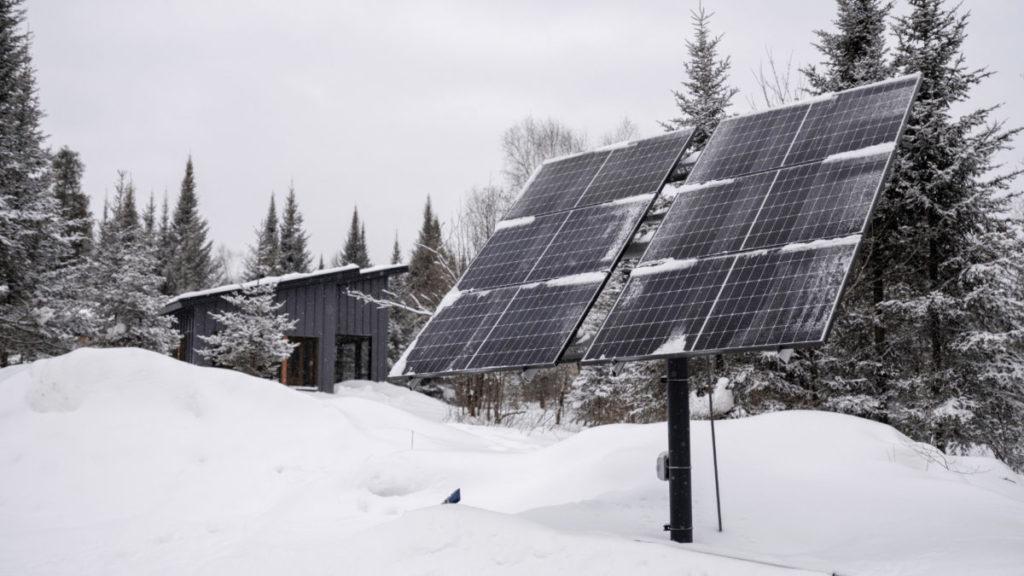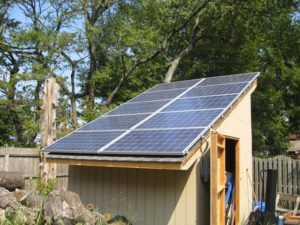As winter months approach, many people assume that solar panels become less effective or even useless during the colder seasons.
However, this assumption is far from reality!
Cold weather actually has little impact on the performance of solar panels, with some studies showing that they can generate just as much energy in the snow as they do in the sun.
Despite these facts, several myths have circulated around cold weather and solar power, making it essential to debunk them once and for all.
By exploring the truth behind each misconception and examining how winter conditions affect solar panels’ efficiency, we can overcome the obstacles that may deter homeowners from harnessing this renewable energy source throughout the year.
Let’s take a closer look at some common cold weather solar power myth-busters to dispel any misconceptions and ensure you get the most out of your investment.
Myth
Solar panels don’t work well in cold weather.
While it is true that solar panels are more efficient in warm temperatures, they can still generate electricity in cold conditions.
In fact, some of the most efficient solar panels are designed specifically to operate in cold climates.
The efficiency of solar panels in cold weather is affected by two main factors: the temperature of the panel itself and the amount of sunlight available.
When the temperature drops, the solar cells in the panel become less efficient at converting sunlight into electricity.
However, the decline in efficiency is typically gradual, and solar panels can still produce a significant amount of electricity even in freezing temperatures.
Moreover, some solar panel manufacturers have designed their products to be more resilient in cold weather.
For instance, some panels are equipped with heating systems that keep the cells at a consistent temperature, ensuring optimal performance even in subzero conditions.
Some manufacturers have developed specialized coatings that help prevent snow and ice from accumulating on the panels, allowing them to continue producing electricity even in snowy and icy environments.
Overall, while solar panels may not operate at their peak efficiency in cold weather, they can still produce a significant amount of electricity.
By choosing solar panels designed for cold climates and incorporating features such as heating systems and specialized coatings, homeowners and businesses in colder regions can harness the power of the sun and reduce their reliance on non-renewable energy sources.
Myth
Solar panels are less efficient in cold weather.
Despite popular belief, solar panels are not less efficient in cold weather.
In fact, solar panels are designed to work most efficiently in temperatures ranging from 25°C to 35°C (77°F to 95°F), which is surprisingly close to the average temperatures found in many cold climates.
While it’s true that solar panels do experience a slight decrease in efficiency at extremely low temperatures (below -25°C or -13°F), this decrease is minimal and does not significantly impact the overall performance of the solar panel.
In fact, solar panels are often equipped with heating systems to ensure optimal performance in cold weather conditions.
Many modern solar panels are designed with special coatings and technologies that help to mitigate the impact of cold weather on efficiency.
So, whether you’re installing solar panels in sunny Florida or icy Alaska, you can rest assured that they will still be highly effective and efficient.
Myth
Solar panels are not reliable in cold weather.
Solar panels are often misunderstood as being less reliable in cold weather, but the truth is that they are actually more efficient in colder temperatures.
While it’s true that solar panels can become less efficient when the temperature drops, the impact is relatively minimal.
In fact, a study by the National Renewable Energy Laboratory found that solar panels actually produce more electricity in cold weather than they do in hot weather.
This is because colder temperatures improve the performance of the solar cells, allowing them to convert more sunlight into electricity.
Furthermore, modern solar panels are designed with advanced technology that allows them to operate effectively in a wide range of temperatures.
So, if you’re considering installing solar panels, don’t let the cold weather deter you – solar panels are just as reliable in winter as they are in summer.
Myth
Cold weather affects the lifespan of solar panels.
Solar panels are designed to operate in a wide range of temperatures, and they are actually more efficient in colder temperatures.
The National Renewable Energy Laboratory (NREL) has conducted studies that show that solar panels can continue to generate electricity effectively even in subfreezing temperatures.
In fact, the panels’ efficiency actually increases in colder temperatures, as the materials used in their construction become less heat-sensitive and more stable.
Furthermore, the lifespan of solar panels is not affected by cold weather.
Solar panels are designed to last for many years, and their lifespan is determined by factors such as the quality of the panels, their exposure to the elements, and the amount of maintenance they receive.
So, while solar panels may not generate as much electricity in cold weather, they are still a reliable and efficient source of clean energy, even in the coldest of temperatures.
Myth
Solar panels require more maintenance in cold weather.
One common misconception about solar panels is that they require more maintenance in cold weather.
However, this is simply not the case.
Solar panels are designed to be durable and long-lasting, and they can withstand a wide range of temperatures, including freezing cold weather.
In fact, many solar panel manufacturers test their products in extreme cold temperatures to ensure their performance and durability.
Furthermore, the cold weather actually helps to improve the efficiency of solar panels, as there is less humidity and less dirt in the air, which can reduce the amount of soiling and improve the overall performance of the panels.
Solar panels are designed with protective coatings and special materials that help to prevent damage from snow and ice buildup.
So, while solar panels may look a bit more dramatic in the snow, they actually require very little maintenance in cold weather.
Overall, solar panels are a reliable and low-maintenance choice for generating renewable energy, regardless of the temperature.
Myth
Solar panels are not cost-effective in cold weather.
Contrary to popular belief, solar panels can actually be more cost-effective in cold weather.
While it’s true that solar panels are less efficient in colder temperatures, the benefits of installing solar panels in cold climates can outweigh the drawbacks.
For one, the lack of sunlight in cold weather can actually lead to a decrease in energy demand, which means that solar panels can provide more than enough power to meet your energy needs.
The initial cost of installing solar panels is often offset by the long-term savings on energy bills.
In fact, some studies have shown that solar panels can be more cost-effective in colder climates than in warmer ones, thanks to the lower energy demand and the potential for net metering programs.
So, if you live in a cold climate and are considering installing solar panels, don’t let the myth hold you back – with the right equipment and installation, solar panels can be a cost-effective and efficient way to power your home.
Myth
Solar panels do not work well in low light conditions.
One common misconception about solar panels is that they do not work well in low light conditions.
However, this is simply not the case.
While it is true that solar panels do require direct sunlight to operate at their most efficient, they can still produce a significant amount of power even in low light conditions.
In fact, many modern solar panels are designed with advanced technology that allows them to absorb light more efficiently, even in low-light conditions.
This means that even on cloudy or overcast days, solar panels can still generate power and help to reduce your carbon footprint.
Many solar panel installations are equipped with monitoring systems that allow homeowners to track the performance of their solar panels in real-time, providing them with valuable insights into their energy usage and production.
So, whether you live in a sunny climate or a cloudy one, solar panels can still be an effective and reliable source of renewable energy for your home.
Myth
Solar power is not a reliable source of energy.
The myth that solar power is not a reliable source of energy is simply not true.
In fact, with the advancements in technology and the increasing adoption of solar power, it is becoming increasingly reliable and viable as a primary source of energy.
The efficiency of solar panels has improved significantly over the years, making them more effective at converting sunlight into electricity.
The integration of energy storage systems like batteries has made it possible to store excess energy generated during peak hours and use it during non-peak hours, ensuring a stable and reliable energy supply.
Moreover, the widespread adoption of smart grids and microgrids has enabled the distribution of energy to be tailored to specific communities and regions, further increasing the reliability of solar power.
In fact, many solar power plants are now equipped with advanced forecasting systems that can predict energy output with remarkable accuracy, allowing for better planning and management of energy supply.
The reliability of solar power has improved dramatically in recent years, and it is now a viable and reliable source of energy for homes, businesses, and communities around the world.
Want More? Dive Deeper Here!
Hey there! If you’re the type who loves going down the rabbit hole of information (like we do), you’re in the right spot. We’ve pulled together some cool reads and resources that dive a bit deeper into the stuff we chat about on our site. Whether you’re just killing time or super into the topic, these picks might just be what you’re looking for. Happy reading!
- Three Myths About Renewable Energy and the Grid, Debunked – Yale E360
- How We Know Today’s Climate Change Is Not Natural
- Dispelling Myths – Climate Science, Risk & Solutions
- (DOC) Debunking free market myths: Transforming pro-poor, sustainable energy access for climate compatible development | David Ockwell, Rob Byrne, and K. Urama – Academia.edu






